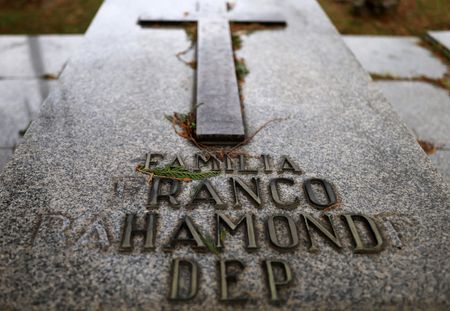By Leo Marchandon
(Reuters) -Shares of Vivendi plunged up to 20% on Wednesday after Le Monde reported that France’s highest civil court may rule in favour of the Bollore family in a pivotal legal dispute against minority shareholders over the group’s multibillion-euro split.
The Cour de Cassation is scheduled to give its decision on November 28, potentially sparing the Bollores a compensation bill estimated between 6 billion and 9 billion euros ($6.9 billion and $10.4 billion).
The French newspaper reported that the advocate general at the court had advised overturning the April decision by the Paris Court of Appeal, which had sided with minority shareholders when ruling that the French market watchdog would have to reconsider whether a mandatory buyout offer is or was necessary when Vivendi split up.
The dispute stems from Vivendi’s 2024 breakup, which saw the media group split into Canal+, Havas, Louis Hachette Group, and a slimmed-down Vivendi. While 97% of shareholders approved the move, minority investors claimed the restructuring unfairly consolidated Bollore’s influence without requiring a mandatory buyout offer.
In July, the French market regulator ordered the Bollore Group to file a draft takeover bid and then a public withdrawal offer within six months for the Vivendi shares it does not own.
“We could have expected a high premium on Vivendi’s share price if there had been a takeover bid. Investors are disappointed because there will be no premium,” Alexandre Desprez, equity research analyst at Alphavalue, said.
The shares had recouped some losses by 1220 GMT, trading 12.3% lower.
The court, Vivendi and Bollore Group did not immediately respond to a Reuters request for comment.
CIAM, the activist investor group that initiated the legal battle, contested the advocate general’s recommendation.
“Fortunately, the recommendations of the advocate general are not always followed,” a CIAM spokesperson told Reuters, saying that the Court of Appeal ruling was based on more than just calculations and emphasized broader arguments establishing control.
The spokesperson added that the Cour de Cassation must at least send the case back to an appellate court. “Otherwise, we would not have the right to a fair trial. It would be a judicial scandal, and we would go before the European Court of Human Rights.”
($1 = 0.8630 euros)
(Reporting by Leo Marchandon in Gdansk, editing by Anna Pruchnicka and Milla Nissi-Prussak)











